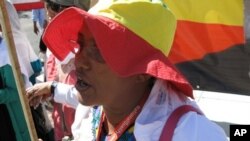U.S.-Africa experts say the United States has a difficult, but crucial relationship with Ethiopia, as the Horn of Africa ally struggles with its democratic credentials.
Pro-democracy activists in the United States had hopes for democratic improvement in 2005 in Ethiopia, when parliamentary elections were fiercely contested, and opposition leaders attracted huge rallies.
But when results were announced, the ruling party was awarded a clear victory. Opposition leaders cried foul and their supporters spilled onto the streets of major cities. About 200 people were reported killed in riots, while their leaders, some of them election winners, were jailed.
Five years later, foreign election observers have described conditions before Sunday's parliamentary election as anything but fair. Observers report shortcomings that include ruling party control of the media, the imprisonment of dozens of opposition leaders and journalists, as well as a lack of independent election monitors.
Severe criticism is also coming from Congress. Several U.S. lawmakers have warned that Ethiopia's government is becoming increasingly authoritarian.
Oberlin College foreign policy teacher Eve Sandberg says the recently appointed U.S. Ambassador to Ethiopia, Donald Booth, told lawmakers he would seek progress in terms of democracy and human-rights protection.
"The Ethiopians have heard this before from U.S. ambassadors and the question is whether or not Mr. Booth will be able to find some leverage with the Ethiopian government to move them toward a better record on human rights," she said.
Sandberg, who has worked as a political consultant in Ethiopia, says the U.S. government faces a dilemma about how much to push in terms of democracy, since Ethiopia is such an important security ally.
"On the one hand, the Ethiopian military was largely responsible for establishing and preserving a Somali government that in the West's eyes is the lesser of many evils, because the opposition to it is an al-Qaida aligned rebel group. Ethiopia is seen also as an important ally because we are reliant on their intelligence services to know what is going on in the Horn [of Africa] and so Ethiopia knows that we need them," she said.
A recent U.S. Embassy deputy chief of mission in Ethiopia, Thomas Hull, agrees.
"Ethiopia is in a very key geo-political situation plus it is the host of the headquarters of the African Union so all those factors make it very difficult for the United States to exert more than moral force on Ethiopia to try to improve its practices," he said.
Hull, who is now an international relations professor at Simmons College, believes competing interests in Africa also make it difficult for the U.S. government to exert leverage.
"Our business relations are not great in terms of volume," he said. "They certainly do not compare to what the Chinese, the Indians and Saudis are doing in Ethiopia. Most of our assistance to the country is humanitarian in terms of food assistance, HIV/AIDS, and so forth."
But a George Mason University professor, Terrence Lyons, believes the Obama administration is trying to change the relationship from what it was under former President Bush.
"Under the prior administration, security concerns, counterterrorism concerns were overwhelmingly dominant in how the United States approached Ethiopia," he said. "Now, I think the administration is looking to re-calibrate this relationship so that the security relationship will certainly remain, but a greater importance will be placed on democracy, human rights and some of these other issues that relate to the democracy and governance side of the ledger."
Lyons says it could take a decade or more to change the relationship. He says U.S. officials need to engage with the new generation of officials from Ethiopia's ruling party, the Ethiopian People's Revolutionary Democratic Front.
In 1991, when that group had taken over the capital Addis Ababa during a rebellion, thousands of supporters stormed the U.S. embassy. They alleged the U.S. Assistant Secretary of State for African Affairs at the time, Herman Cohen, had facilitated the rebel takeover as well as a referendum for the breakaway of Eritrea during peace talks in London.
Cohen said he was acting in the interests of restoring stability, but warned Ethiopia's new leaders they should not expect international cooperation without democracy.
Experts say 20 years later the same U.S. dilemma of simultaneously trying to promote democracy and stability in the Horn of Africa remains.
Experts say US Government Walks Fine Line with Ethiopia










